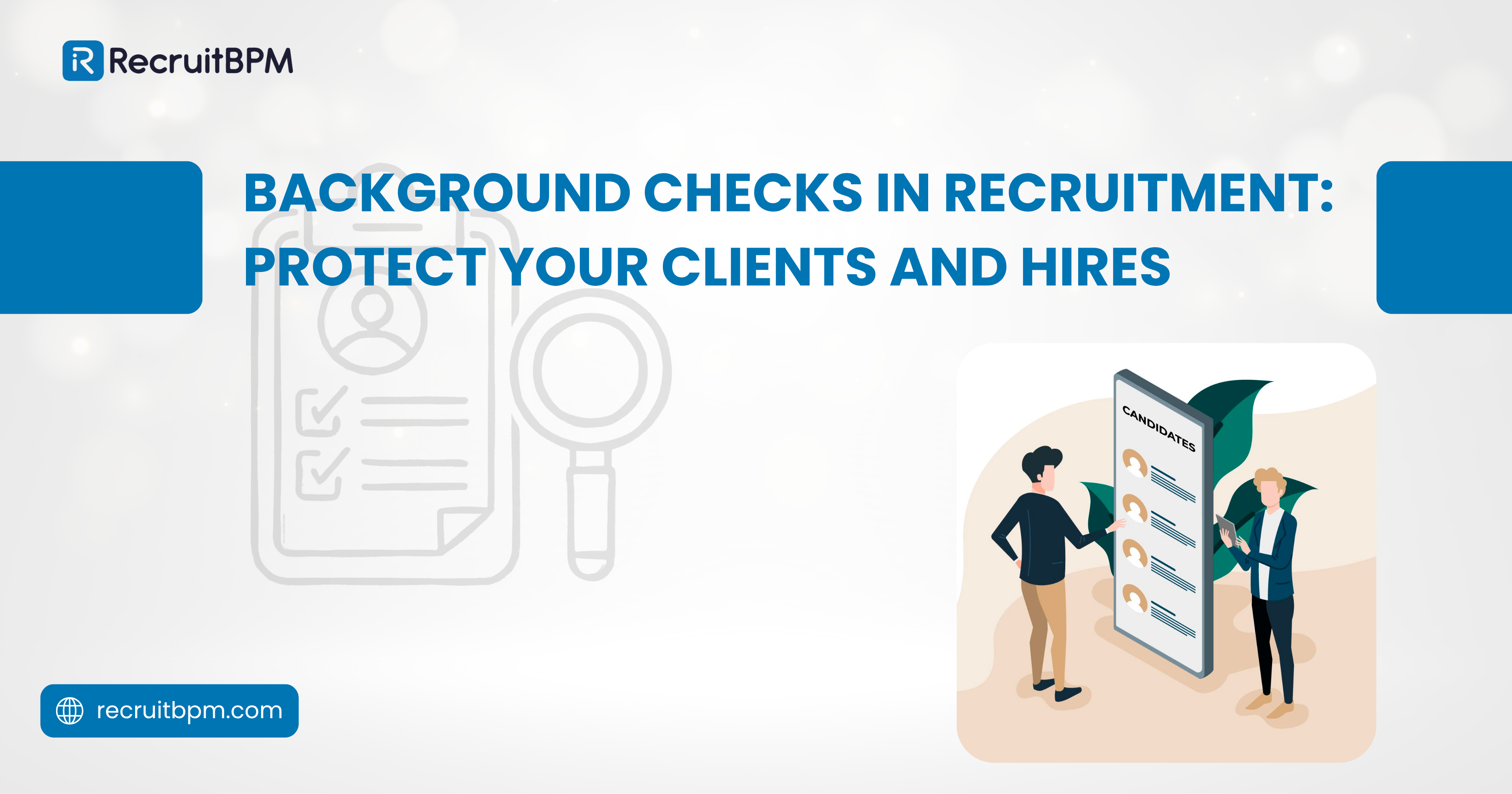Candidates present carefully curated versions of themselves through resumes and interviews. Experience claims, education credentials, and employment histories arrive pre-packaged and polished. Yet recruitment agencies stake their reputation on placement accuracy, making verification essential rather than optional.
Background checks transform hiring from trust-based guesswork into evidence-based decision-making. These investigations reveal the truth behind candidate claims, protecting clients from costly hiring mistakes while safeguarding your agency’s credibility. Understanding how to implement background screening strategically separates professional recruitment agencies from those gambling with placement quality.
What is a Background Check?
A background check is a systematic verification process that confirms candidate’s identity, validates credentials, and investigates personal and professional history to assess suitability for employment. This screening examines multiple aspects of a candidate’s background, including criminal records, employment history, education credentials, credit reports, driving records, and professional licenses.
Background checks are common screening processes used by employers to verify a candidate’s history, ensuring they meet the standards and qualifications required for a role. The process can include reviews of employment, education, criminal records, and other areas to assess candidate suitability comprehensively.
Background screening is conducted by HR departments—both internal and outsourced—that systematically verify a candidate’s relevant professional and personal details. It involves several checks, which can be performed in various ways, depending on the organization’s location, industry regulations, and role requirements.
Modern background checks leverage databases, court records, educational institution verifications, previous employer references, and credit bureaus to compile comprehensive candidate profiles. The depth and scope of screening varies significantly based on position sensitivity, industry requirements, and regulatory obligations.
Pre-employment background checks help employers confirm candidate identity, assess qualifications, and protect their workplace from fraud, safety issues, and legal risks. These investigations provide the factual foundation that resumes and interviews alone cannot deliver.
Why Background Check Matters for Recruitment Agencies?
The recruitment industry increasingly recognizes background screening as essential infrastructure rather than an optional enhancement. The statistics paint a compelling picture of necessity.
Industry adoption validates the importance. The Professional Background Screening Association reports that 93% of companies conduct some type of background check. This near-universal adoption creates standardized client expectations that recruitment agencies must meet to remain competitive.
Market growth reflects increasing value. The employment screening services market was valued at $6.6 billion in 2023 and is estimated to reach $19.6 billion by 2033, growing at a CAGR of 11.2% from 2024 to 2033. This explosive growth demonstrates that organizations view background screening as an increasingly critical investment rather than a discretionary expense.
Risk mitigation drives adoption. 38% of companies perform background checks to help minimize the risk of future criminal activity, 27% to fulfill regulatory compliance, and 17% to ensure the applicant’s qualifications are legitimate. These motivations reveal background screening’s role in protecting organizations from multiple threat categories simultaneously.
Credential verification prevents fraud. Resume embellishment occurs more frequently than most realize. Candidates exaggerate job titles, extend employment dates to hide gaps, claim degrees never earned, and fabricate certifications they don’t possess. Without background checks, employers have only the information supplied by the applicant to form the basis of their hiring decision, and such details may not be accurate or complete.
Agency reputation depends on placement quality. Recruitment agencies that place candidates who later fail background checks or reveal disqualifying information damage client relationships permanently. One bad placement resulting from inadequate screening can cost your agency multiple future opportunities with that client.
Liability protection becomes essential. Negligent hiring lawsuits hold employers—and potentially recruitment agencies—liable for damages caused by employees whose problematic backgrounds should have been discovered through proper screening. Background checks create documentation demonstrating due diligence.
Workplace safety concerns justify screening. Some positions involve vulnerable populations, access to sensitive data, financial responsibilities, or physical security. Background checks identify candidates whose histories present unacceptable risks in these contexts, protecting both clients and the individuals they serve.
Regulatory compliance requires verification. Healthcare, finance, education, transportation, and government contracting all impose mandatory background screening requirements. Recruitment agencies placing candidates in regulated industries must ensure compliance or face legal consequences.
Competitive advantage emerges through thoroughness. Agencies known for rigorous candidate vetting attract quality-conscious clients willing to pay premium fees. Conversely, agencies cutting corners on background screening compete primarily on price with candidates of questionable quality.
How to Use Background Checks Effectively
Implementing background screening successfully requires strategic planning, legal compliance, and integration with existing recruitment workflows rather than treating checks as afterthoughts.
Establish clear screening policies. Define what background checks you’ll conduct for different position types. Entry-level retail roles require a different screening depth than CFO placements. Document your standard practices to ensure consistency and demonstrate systematic approaches to clients and candidates.
Obtain proper candidate consent. Legal requirements mandate written authorization before conducting background checks. Provide clear disclosure forms explaining what information you’ll obtain, how it will be used, and the candidate’s rights throughout the process. Federal law, through the Fair Credit Reporting Act (FCRA), establishes strict consent and notification requirements.
Partner with reputable screening providers. Professional background check companies possess database access, legal expertise, and verification processes that individual agencies can’t replicate. Select vendors with strong accuracy records, regulatory compliance, and reasonable turnaround times. Cheap providers often deliver incomplete or inaccurate reports that create more problems than they solve.
Timing background checks appropriately. Conduct screening after conditional offer acceptance but before final hiring decisions. This timing prevents wasted screening costs on candidates who won’t accept offers while ensuring verification occurs before employment begins. Some positions require screening earlier in the process due to security clearance requirements.
Verify information systematically. Don’t rely on single verification sources. Cross-reference employment history with multiple previous employers, confirm education credentials directly with institutions, and validate licenses through official registries. Comprehensive verification catches inconsistencies that partial checking misses.
Evaluate results contextually. Not all background check findings automatically disqualify candidates. Consider the nature of discovered issues, their relevance to position requirements, how long ago events occurred, and evidence of rehabilitation. A decade-old minor offense may have no bearing on current suitability for most positions.
Maintain candidate communication. Keep candidates informed about screening timelines and next steps. Unexpected delays create anxiety and may cause top candidates to accept competing offers. Transparent communication demonstrates professionalism and maintains positive relationships regardless of outcomes.
Follow adverse action procedures. When background checks reveal disqualifying information, legal requirements mandate specific notification processes. Provide pre-adverse action notices giving candidates the opportunity to dispute inaccuracies before final decisions. Document your process meticulously to demonstrate compliance if challenged.
Protect sensitive information. Background check reports contain private data requiring careful handling. Limit access to authorized personnel, store reports securely, and dispose of them properly according to legal retention requirements. Data breaches involving background check information create severe liability.
Track screening effectiveness. Monitor which background check components provide the most valuable information for different role types. Analyze false positive rates, turnaround times, and cost-effectiveness across screening providers. Data-driven evaluation ensures you’re investing resources wisely.
Common Challenges with Background Checks
Despite significant benefits, background screening introduces challenges that recruitment agencies must navigate carefully to maximize value while managing risks and costs.
Turnaround time pressures create urgency conflicts. Thorough background checks require days or weeks, particularly when verifying international credentials or accessing court records in multiple jurisdictions. Yet clients demand fast placements, and top candidates have competing offers. Balancing thoroughness against speed challenges recruitment agencies constantly.
Cost considerations strain budgets. Comprehensive background checks cost $50 to $200+ per candidate, depending on scope. These expenses multiply quickly, especially for positions attracting hundreds of applicants. Determining appropriate screening depth for different role types requires strategic thinking about cost versus risk.
Legal compliance complexity varies by jurisdiction. Background check regulations differ dramatically across states and countries. Ban-the-box laws restrict when criminal history can be considered, salary history bans limit what information employers can request, and data privacy regulations govern information handling. Maintaining compliance across multiple jurisdictions demands continuous legal monitoring.
Accuracy concerns undermine confidence. Background check reports sometimes contain errors—wrong-person matches, outdated information, or incomplete records. These inaccuracies can unfairly eliminate qualified candidates or create liability when incorrect information influences hiring decisions. Candidates have dispute rights, but resolution processes take time.
Criminal record interpretation requires judgment. Discovered criminal history doesn’t automatically disqualify candidates for all positions. Agencies must evaluate the offense nature, time elapsed, rehabilitation evidence, and relevance to specific roles. Blanket policies eliminating anyone with any criminal record may violate fair chance employment laws, while overly lenient approaches expose clients to risk.
International verification challenges complicate global recruitment. Verifying credentials from foreign educational institutions, confirming employment with overseas companies, and accessing criminal records from other countries involves language barriers, different verification processes, and extended timelines. Global placements require specialized screening expertise.
False positive rates create candidate friction. Common names, similar birthdates, and overlapping addresses can trigger criminal record matches for the wrong person. Candidates facing these false accusations experience frustration and may withdraw from consideration despite being completely cleared eventually.
Scope determination lacks standardization. Deciding which background check components to include for different positions involves subjective judgment. Should you check credit for all roles or only those involving financial responsibility? How far back should employment verification extend? Different agencies adopt different practices, creating inconsistency.
Candidate experience concerns affect employer brand. Intrusive background screening requests or poorly communicated processes damage candidate relationships. Even candidates who pass screening may develop negative impressions affecting their likelihood of accepting offers or referring others.Ban-the-box laws complicate criminal history screening. Growing numbers of jurisdictions prohibit asking about criminal history on initial applications or during early recruitment stages. These fair chance laws require agencies to delay criminal background checks until after conditional offers, complicating screening workflows and occasionally resulting in revoked offers that create awkward situations.

















